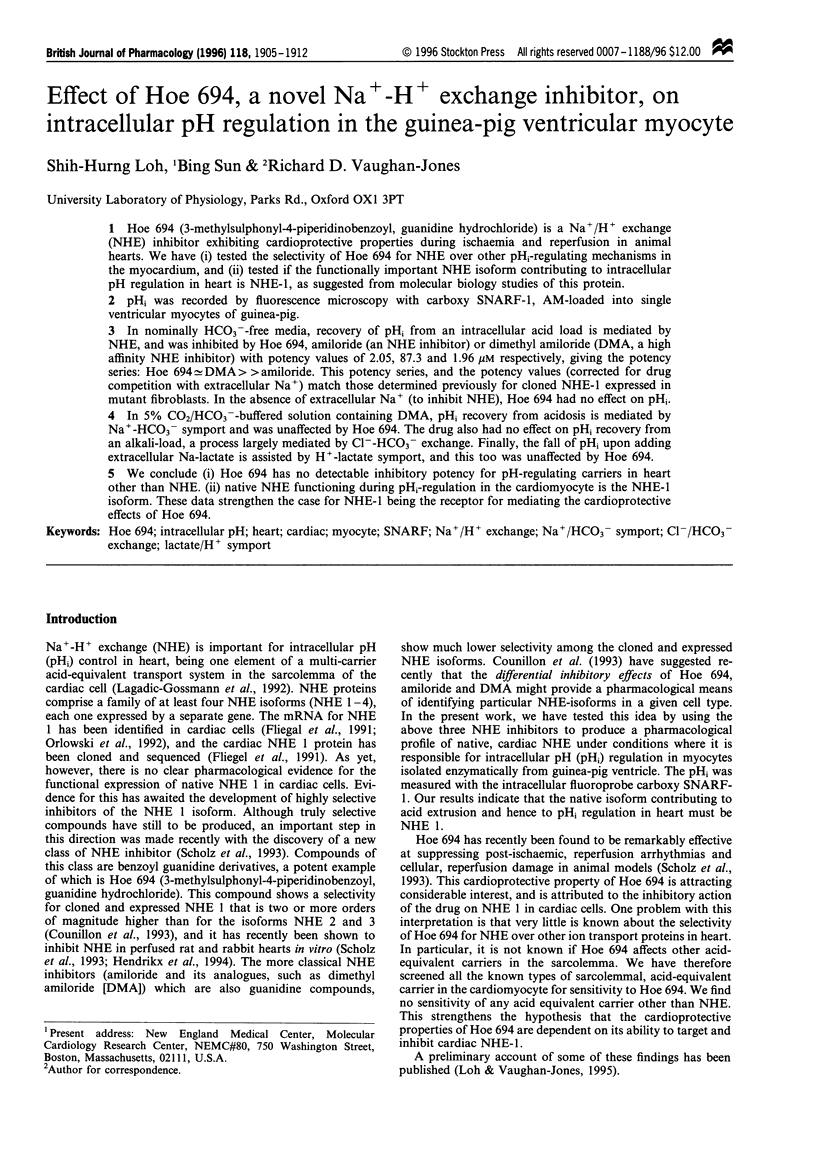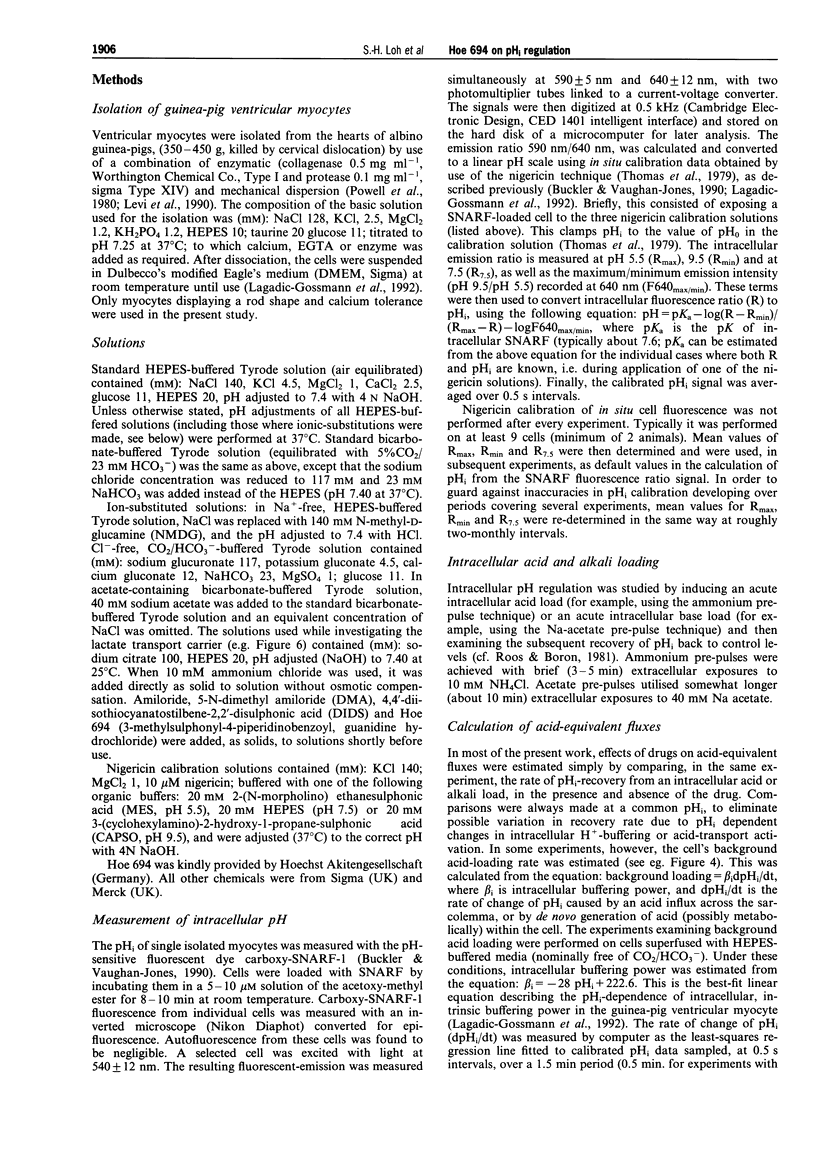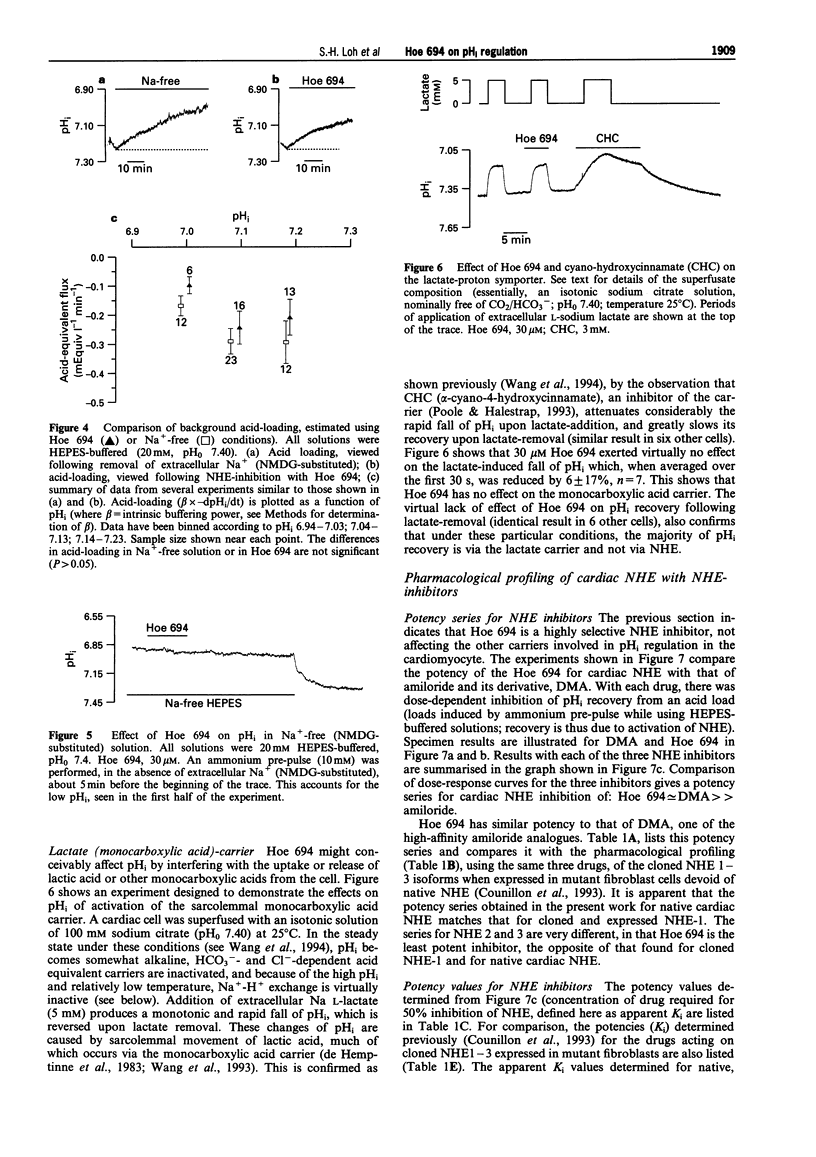Abstract
1. Hoe 694 (3-methylsulphonyl-4-piperidinobenzoyl, guanidine hydrochloride) is a Na+/H+ exchange (NHE) inhibitor exhibiting cardioprotective properties during ischaemia and reperfusion in animal hearts. We have (i) tested the selectivity of Hoe 694 for NHE over other pHi-regulating mechanisms in the myocardium, and (ii) tested if the functionally important NHE isoform contributing to intracellular pH regulation in heart is NHE-1, as suggested from molecular biology studies of this protein. 2. pHi was recorded by fluorescence microscopy with carboxy SNARF-1, AM-loaded into single ventricular myocytes of guinea-pig. 3. In nominally HCO3-free media, recovery of pHi from an intracellular acid load is mediated by NHE, and was inhibited by Hoe 694, amiloride (an NHE inhibitor) or dimethyl amiloride (DMA, a high affinity NHE inhibitor) with potency values of 2.05, 87.3 and 1.96 microM respectively, giving the potency series: Hoe 694 congruent to DMA > > amiloride. This potency series, and the potency values (corrected for drug competition with extracellular Na+) match those determined previously for cloned NHE-1 expressed in mutant fibroblasts. In the absence of extracellular Na+ (to inhibit NHE), Hoe 694 had no effect on pHi. 4. In 5% CO2/HCO3(-)-buffered solution containing DMA, pHi recovery from acidosis is mediated by Na(+)-HCO3- symport and was unaffected by Hoe 694. The drug also had no effect on pHi recovery from an alkali-load, a process largely mediated by Cl(-)-HCO3- exchange. Finally, the fall of pHi upon adding extracellular Na-lactate is assisted by H(+)-lactate symport, and this too was unaffected by Hoe 694. 5. We conclude (i) Hoe 694 has no detectable inhibitory potency for pH-regulating carriers in heart other than NHE. (ii) native NHE functioning during pHi-regulation in the cardiomyocyte is the NHE-1 isoform. These data strengthen the case for NHE-1 being the receptor for mediating the cardioprotective effects of Hoe 694.
Full text
PDF







Selected References
These references are in PubMed. This may not be the complete list of references from this article.
- Alper S. L. The band 3-related anion exchanger (AE) gene family. Annu Rev Physiol. 1991;53:549–564. doi: 10.1146/annurev.ph.53.030191.003001. [DOI] [PubMed] [Google Scholar]
- Buckler K. J., Vaughan-Jones R. D. Application of a new pH-sensitive fluoroprobe (carboxy-SNARF-1) for intracellular pH measurement in small, isolated cells. Pflugers Arch. 1990 Oct;417(2):234–239. doi: 10.1007/BF00370705. [DOI] [PubMed] [Google Scholar]
- Counillon L., Pouysségur J. Structure-function studies and molecular regulation of the growth factor activatable sodium-hydrogen exchanger (NHE-1). Cardiovasc Res. 1995 Feb;29(2):147–154. [PubMed] [Google Scholar]
- Counillon L., Scholz W., Lang H. J., Pouysségur J. Pharmacological characterization of stably transfected Na+/H+ antiporter isoforms using amiloride analogs and a new inhibitor exhibiting anti-ischemic properties. Mol Pharmacol. 1993 Nov;44(5):1041–1045. [PubMed] [Google Scholar]
- Dart C., Vaughan-Jones R. D. Na(+)-HCO3- symport in the sheep cardiac Purkinje fibre. J Physiol. 1992;451:365–385. doi: 10.1113/jphysiol.1992.sp019169. [DOI] [PMC free article] [PubMed] [Google Scholar]
- Ellis D., MacLeod K. T. Sodium-dependent control of intracellular pH in Purkinje fibres of sheep heart. J Physiol. 1985 Feb;359:81–105. doi: 10.1113/jphysiol.1985.sp015576. [DOI] [PMC free article] [PubMed] [Google Scholar]
- Fliegel L., Dyck J. R., Wang H., Fong C., Haworth R. S. Cloning and analysis of the human myocardial Na+/H+ exchanger. Mol Cell Biochem. 1993 Aug 25;125(2):137–143. doi: 10.1007/BF00936442. [DOI] [PubMed] [Google Scholar]
- Fliegel L., Sardet C., Pouyssegur J., Barr A. Identification of the protein and cDNA of the cardiac Na+/H+ exchanger. FEBS Lett. 1991 Feb 11;279(1):25–29. doi: 10.1016/0014-5793(91)80241-t. [DOI] [PubMed] [Google Scholar]
- Frelin C., Vigne P., Lazdunski M. The role of the Na+/H+ exchange system in cardiac cells in relation to the control of the internal Na+ concentration. A molecular basis for the antagonistic effect of ouabain and amiloride on the heart. J Biol Chem. 1984 Jul 25;259(14):8880–8885. [PubMed] [Google Scholar]
- Hendrikx M., Mubagwa K., Verdonck F., Overloop K., Van Hecke P., Vanstapel F., Van Lommel A., Verbeken E., Lauweryns J., Flameng W. New Na(+)-H+ exchange inhibitor HOE 694 improves postischemic function and high-energy phosphate resynthesis and reduces Ca2+ overload in isolated perfused rabbit heart. Circulation. 1994 Jun;89(6):2787–2798. doi: 10.1161/01.cir.89.6.2787. [DOI] [PubMed] [Google Scholar]
- Kimura J., Noma A., Irisawa H. Na-Ca exchange current in mammalian heart cells. Nature. 1986 Feb 13;319(6054):596–597. doi: 10.1038/319596a0. [DOI] [PubMed] [Google Scholar]
- Lagadic-Gossmann D., Buckler K. J., Vaughan-Jones R. D. Role of bicarbonate in pH recovery from intracellular acidosis in the guinea-pig ventricular myocyte. J Physiol. 1992 Dec;458:361–384. doi: 10.1113/jphysiol.1992.sp019422. [DOI] [PMC free article] [PubMed] [Google Scholar]
- Orlowski J., Kandasamy R. A., Shull G. E. Molecular cloning of putative members of the Na/H exchanger gene family. cDNA cloning, deduced amino acid sequence, and mRNA tissue expression of the rat Na/H exchanger NHE-1 and two structurally related proteins. J Biol Chem. 1992 May 5;267(13):9331–9339. [PubMed] [Google Scholar]
- Poole R. C., Halestrap A. P. Transport of lactate and other monocarboxylates across mammalian plasma membranes. Am J Physiol. 1993 Apr;264(4 Pt 1):C761–C782. doi: 10.1152/ajpcell.1993.264.4.C761. [DOI] [PubMed] [Google Scholar]
- Powell T., Terrar D. A., Twist V. W. Electrical properties of individual cells isolated from adult rat ventricular myocardium. J Physiol. 1980 May;302:131–153. doi: 10.1113/jphysiol.1980.sp013234. [DOI] [PMC free article] [PubMed] [Google Scholar]
- Roos A., Boron W. F. Intracellular pH. Physiol Rev. 1981 Apr;61(2):296–434. doi: 10.1152/physrev.1981.61.2.296. [DOI] [PubMed] [Google Scholar]
- Scholz W., Albus U., Lang H. J., Linz W., Martorana P. A., Englert H. C., Schölkens B. A. Hoe 694, a new Na+/H+ exchange inhibitor and its effects in cardiac ischaemia. Br J Pharmacol. 1993 Jun;109(2):562–568. doi: 10.1111/j.1476-5381.1993.tb13607.x. [DOI] [PMC free article] [PubMed] [Google Scholar]
- Stevenson K. M., Lumbers E. R. Effects of angiotensin II in fetal sheep and modification of its actions by indomethacin. J Physiol. 1995 Aug 15;487(1):147–158. doi: 10.1113/jphysiol.1995.sp020867. [DOI] [PMC free article] [PubMed] [Google Scholar]
- Thomas J. A., Buchsbaum R. N., Zimniak A., Racker E. Intracellular pH measurements in Ehrlich ascites tumor cells utilizing spectroscopic probes generated in situ. Biochemistry. 1979 May 29;18(11):2210–2218. doi: 10.1021/bi00578a012. [DOI] [PubMed] [Google Scholar]
- Vaughan-Jones R. D. An investigation of chloride-bicarbonate exchange in the sheep cardiac Purkinje fibre. J Physiol. 1986 Oct;379:377–406. doi: 10.1113/jphysiol.1986.sp016259. [DOI] [PMC free article] [PubMed] [Google Scholar]
- Vaughan-Jones R. D. Regulation of chloride in quiescent sheep-heart Purkinje fibres studied using intracellular chloride and pH-sensitive micro-electrodes. J Physiol. 1979 Oct;295:111–137. doi: 10.1113/jphysiol.1979.sp012957. [DOI] [PMC free article] [PubMed] [Google Scholar]
- Wang X., Levi A. J., Halestrap A. P. Kinetics of the sarcolemmal lactate carrier in single heart cells using BCECF to measure pHi. Am J Physiol. 1994 Nov;267(5 Pt 2):H1759–H1769. doi: 10.1152/ajpheart.1994.267.5.H1759. [DOI] [PubMed] [Google Scholar]
- Wang X., Poole R. C., Halestrap A. P., Levi A. J. Characterization of the inhibition by stilbene disulphonates and phloretin of lactate and pyruvate transport into rat and guinea-pig cardiac myocytes suggests the presence of two kinetically distinct carriers in heart cells. Biochem J. 1993 Feb 15;290(Pt 1):249–258. doi: 10.1042/bj2900249. [DOI] [PMC free article] [PubMed] [Google Scholar]
- Wu M. L., Tsai M. L., Tseng Y. Z. DIDS-sensitive pHi regulation in single rat cardiac myocytes in nominally HCO3-free conditions. Circ Res. 1994 Jul;75(1):123–132. doi: 10.1161/01.res.75.1.123. [DOI] [PubMed] [Google Scholar]
- Xu P., Spitzer K. W. Na-independent Cl(-)-HCO3- exchange mediates recovery of pHi from alkalosis in guinea pig ventricular myocytes. Am J Physiol. 1994 Jul;267(1 Pt 2):H85–H91. doi: 10.1152/ajpheart.1994.267.1.H85. [DOI] [PubMed] [Google Scholar]
- Yun C. H., Tse C. M., Nath S. K., Levine S. A., Brant S. R., Donowitz M. Mammalian Na+/H+ exchanger gene family: structure and function studies. Am J Physiol. 1995 Jul;269(1 Pt 1):G1–11. doi: 10.1152/ajpgi.1995.269.1.G1. [DOI] [PubMed] [Google Scholar]
- de Hemptinne A., Marrannes R., Vanheel B. Influence of organic acids on intracellular pH. Am J Physiol. 1983 Sep;245(3):C178–C183. doi: 10.1152/ajpcell.1983.245.3.C178. [DOI] [PubMed] [Google Scholar]


